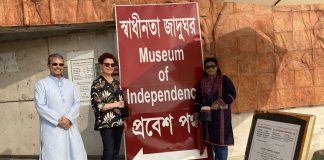When Shanaz Ahmed invited her primary school friend Angela Fox to Bangladesh for two months, they had no idea the country would change so drastically within a few months. Shanaz, a British Bangladeshi solicitor, was in her hometown of Sylhet for two months with her husband Shaukat Ahmed when she sent out a post on Facebook inviting non-Bangladeshi friends to visit her in Bangladesh for free. She announced that if they bought tickets to Bangladesh, she would take care of all other costs from the moment they land, including food and accommodation.
“I wanted to promote Bangladesh since it was doing so well,” she says.
Shanaz’s friend Angela agreed to visit her, and it was a chance for them to reconnect. Though the two had attended school together for five years, they had lost touch for almost 30 years. With the lack of social media and personal phones, Shanaz and Angela had little to no way of keeping in touch with each other. When they reconnected through Facebook years later, they found they were still good friends.
“We really bonded, after all that time,” Shanaz reminisced. “After about 30 years.”
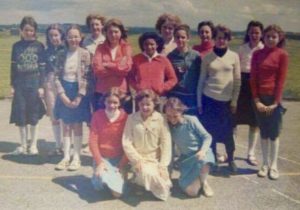
As someone who had never been to a South Asian country before, Angela’s trip to Bangladesh was a new experience. She travelled during Christmas of 2023, which meant she had to spend the holiday away from her family. During her two weeks in Bangladesh, she was able to witness the election in January 2024. She was also able to visit various tourist spots including large mosques, Christian churches, Buddhist and Hindu temples, and museums.
Angela adapted well to Bangladesh, eating traditional fish dishes, which she loved. She even wore sarees and kameezes and spoke with adults and children in English as she didn’t know Bangla or Hindi. Being tall and pale, she was easily noticed as a foreigner and people regularly approached her on the street, with mothers urging their children to practice their English by speaking with her.
“They didn’t want to talk to me, they wanted to talk to Angie,” Shanaz said, laughing. “I didn’t mind though. She’s so modest, she kept saying “no, no, talk to Shanaz,” but they kept wanting to speak to Angie.”
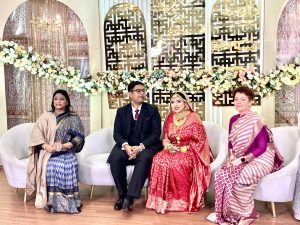
Angela, who lived with Shanaz and her family in Dhaka, really connected with them and even participated in Shanaz’s niece’s wedding.
“She attended my niece’s small Mehndi party at her home, the big Gaye-Holud event, and the wedding. She did all the preparations for things like putting together the palm displays and booking the donkey,” Shanaz said fondly. “She loved the wedding experience. She’s a very friendly person, and really nice. At the wedding she was talking to children all the time, wanting to hear from them, and they would relate to her.”
A week after Angela left, Shanaz was joined in Bangladesh by two other friends: a former colleague and her husband. British Indian solicitor Nasreen Khan and her French Indian husband Ashraf Khan were used to travelling a lot, and enjoyed their stay in Bangladesh, expressing how they felt safe and happy in the country. They visited various parts of Bangladesh, from the tea gardens of Sylhet to the port city of Chittagong. Shanaz recalls how Nasreen and Ashraf weren’t treated like foreigners the way Angela was, as they didn’t look too different from the natives.
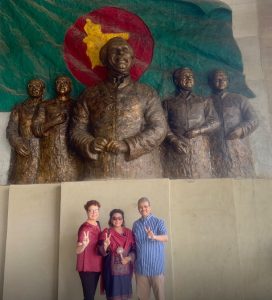
Shanaz and her friends were planning on returning to Bangladesh in 2026, after the three friends enjoyed their experience greatly. However, with the riots that took place and the change in government, Shanaz isn’t sure if they’ll ever return.
Shanaz and her friends are saddened by the damage caused by the student uprising. She is disappointed at the reports of attacks on the Hindu minority, revealing how all her friends in Bangladesh come from different faiths and are all appreciative of each other’s backgrounds.
“Christmas, Diwali… we used to celebrate everything together,” Shanaz recounts. “It was Bangladeshi first, then religion. I’m worried about Bangladesh now, with minorities being attacked. They took down statues. The museum has been looted, and lots of precious items have been stolen and burnt. Why? If you’ve got a genuine dispute, why do you burn down buildings?”
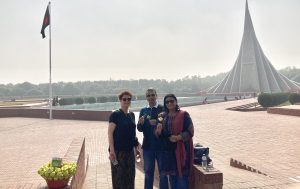
Shanaz said strikes and protests should’ve targeted the government, not civilians. She explained how Bangladesh has come far, after having struggled to gain independence from Pakistan. Shanaz’s father, who deserted the East Pakistan army and moved to England in 1964, worked two jobs and sent the money back to finance Bangladesh’s Independence War. As a result, Shanaz and her siblings grew up struggling.
“If he was alive, he would be so saddened,” said Shanaz. “He really believed in Sheikh Najib and the independence of Bangladesh.”
Despite all her struggles, Shanaz is profoundly grateful to her parents for all they did. She is proud of her father’s contribution to Bangladesh’s independence while providing for the family, and her mother’s sacrifices as she raised four children in a foreign country to the best of her ability.
“I grew up in a poor area, but I was rich because I had my family, and relatives close to me.”
With children and grandchildren of her own, Shaukat is a successful solicitor working with Child Protection, and organisations like BEAP. Despite having been born and raised in Bradford, Shanaz is still strongly connected to her Bangladeshi roots.



